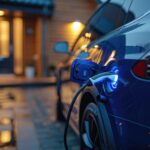
Charging and maintaining your EV: The costs and the requirements
16 September 2024
What is bringing down the cost of an electric car in 2024?
17 September 2024The health and financial benefits of owning an EV
You hear it everywhere—EVs are good for the environment. They can be powered by greener, renewable energy. They help reduce CO2 emissions. And they drive us towards a more sustainable lifestyle that’s healthier for you and the planet. But that’s not all. There are significant health and financial benefits to owning an EV that shouldn’t be ignored.
Here’s what you need to know.
EVs and your health
Exhaust particle fumes
We’re used to hearing about the link between exhaust fumes and respiratory illnesses, including childhood asthma. They’re one of the main reasons behind the introduction of ULEZ and Clean Air Zones.
What’s less commonly known is that exhaust fumes from traditional internal combustion engine vehicles (ICEVs) are also a major factor in long-term chronic health issues, cardiovascular diseases, and even damage to your eyes.
Not with an EV.
Noise pollution
We really don’t talk about the detrimental effects of noise pollution enough.
But first things first, what is noise pollution?
Simply put, it’s unwanted and excessive sound.
That doesn’t mean just industrial facilities, construction works, festivals, and outdoor parties. Noise pollution also comes from highways, railways, aeroplanes, and even a busy street in the city.
We all know that high volumes of noise can cause physical damage to the eardrum and temporary or even permanent hearing loss. But here’s the essential bit—even at lower levels (think noisy capital city), noise pollution can:
- Interfere with recreation and communication
- Raise blood pressure and pulse rates
- Cause irritability and anxiety
- Lead to mental fatigue
- Disrupt sleep
The effects on children are even worse—stress, impairments in memory and lower attention spans.
That is, until we fill our streets with EVs.
EVs and the environment
Noise pollution
It’s bad for human health, but the effects on wildlife might be worse.
Many animals, from insects to whales, rely on sound for nearly every aspect of their existence:
- Navigating
- Finding food
- Communicating
- Attracting a mate
- Avoiding predators
Excessive noise pollution can lead to changes in behaviour and migration patterns. It can cause issues in animals’ cardiovascular system, and, just like in humans, increase stress and disrupt sleep.
Noise pollution isn’t just damaging to the health of wildlife. To many, it’s an existential threat.
Switching to an EV won’t remove all these problems, but it will go a long way.
Air pollutants
Imagine standing in central London and taking a deep breath of fresh air. With EVs filling our streets instead of gas and petrol cars, we’ll be a few steps closer to that reality.
It’s not just a matter of exhaust emissions.
Particulate matter is another considerable source of air pollution (and health problems).
There are many sources of particulate matter. One of those? Hitting the brakes on your car.
The brake pads against the brake discs create microscopic particulate matter dust. While this happens with all cars, electric or not, EVs emit far less particulate matter dust, thanks to their regenerative braking technology.
- An EV emits 17-30% fewer air pollutants than an ICEV
- After about 30,000 miles of driving, an EV has saved more emissions than its manufacturing created.
- In just above a year, one EV saves as much CO2 as it takes to fly four return flights from London to Barcelona.
We think that’s pretty impressive.
Manufacturing and toxic land waste
Leaks and spills from oil and fuel are yet another way ICE vehicles harm the environment. They get into the ground and water sources, damaging water supply and entire ecosystems.
Yes, the manufacturing process of EVs is still a challenge. But it requires fewer materials compared to ICEVs. And many of the negative effects can be minimised through a circular economy approach.
Different ways of reducing manufacturing waste are already being explored, including:
- Recycling EV batteries
- Reusing batteries for solar energy storage
- Repurposing battery modules for energy storage solutions
Maintenance
Changing filters and engine oil. Brake maintenance. Air filter replacements. Cleaning residue from fuel and combustion processes.
There are a lot of harmful elements involved in maintaining a diesel or petrol-powered car (particularly if chemicals aren’t disposed of properly).
Unlike ICE vehicles, however, EVs don’t require any of that.
- They have fewer air filters, if any at all.
- They need fewer maintenance visits, thanks to much of it being done via over-the-air (OTA) services.
- They use regenerative braking technology that reduces the wear and tear on brake pads and requires fewer replacements compared to conventional vehicles.
- They create less brake dust, a known source of air pollution that contaminates waterways and surrounding ecosystems.
EVs and your wallet
There are several ways an EV will lead to considerable financial benefits.
Running costs
Benefits occur from cost savings of electricity versus petrol or diesel, especially if they incorporate solar power and charge from home.
With a solution like Powerverse, you can save hundreds of pounds per year.
Add a home energy management solution to the mix, and you’re at a whole new level of budget efficiency.
Charging isn’t an issue either.
The number of public charging stations keeps growing, there’s an entire network of free charging stations, and the government’s grant for home EV chargepoint installation helps you save up to 75% of the purchase and installation costs.
When did you last see a deal like that for an ICEV?
Maintenance costs
Those regular oil changes, transmission servicing, and exhaust system repairs — they’re all in the past.
With fewer moving parts, regenerative braking technology, and OTA services and upgrades, EVs can be considerably easier and cheaper to maintain than your traditional gas-guzzler.
Taxes and other charges
You’ll save here, too.
Another benefit is that EV owners are exempt from the vehicle tax. And when it comes to environmental regulations and related charges, they are completely future-proofed.
Just think of ULEZ or the new Euro 7 standards, which set strict emission limits on cars, vans, trucks, and buses. With an EV, you’re automatically compliant — and penalty-free.
About Powerverse
We’re industry experts in home energy management. Our easy-to-use app is built for your future electric home. It will effortlessly sync your solar, battery, heat pump, EV charger and more, helping you cut costs and your carbon footprint on your way to becoming energy-independent. Curious to know more? Talk to one of our experts.

